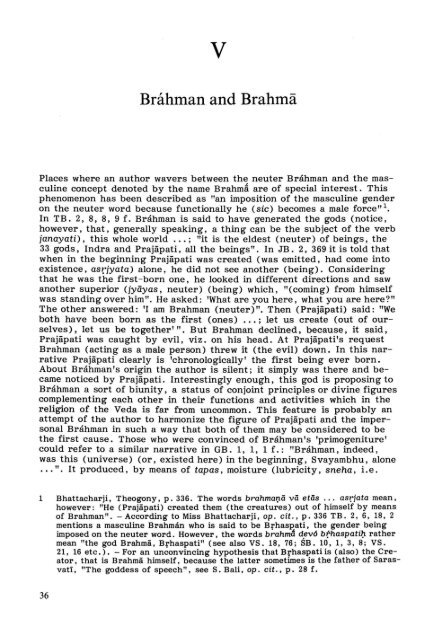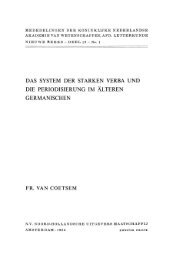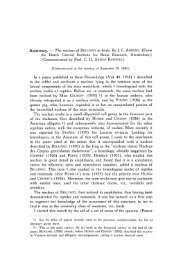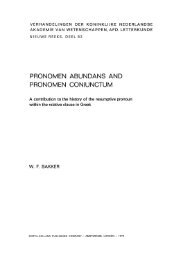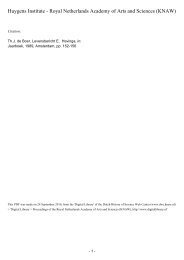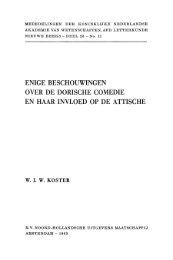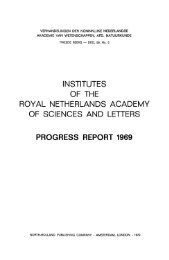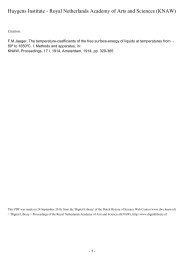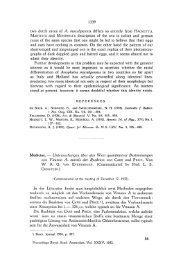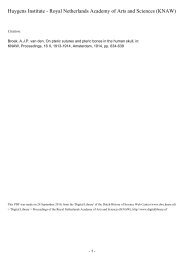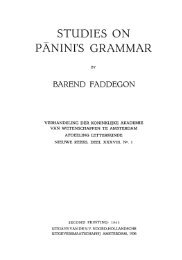Prajapati's relations with Brahman, Brhaspati and Brahma - DWC
Prajapati's relations with Brahman, Brhaspati and Brahma - DWC
Prajapati's relations with Brahman, Brhaspati and Brahma - DWC
You also want an ePaper? Increase the reach of your titles
YUMPU automatically turns print PDFs into web optimized ePapers that Google loves.
v<br />
Bráhman <strong>and</strong> Brahmä<br />
Places where an author wavers bet ween the neuter Bráhman <strong>and</strong> the masculine<br />
concept denoted by the name Brahmä are of special interest. This<br />
phenomenon has been described as "an imposition of the masculine gen der<br />
on the neuter word because functionally he (sic) becomes a male force" 1.<br />
In TB. 2, 8, 8, 9 f. Bráhman is said to have generated the gods (notice,<br />
however, that, gene rally speaking, a thing can be the subject of the verb<br />
janayati) , this whole world ... ; "it is the eldest (neuter) of beings, the<br />
33 gods, Indra <strong>and</strong> Prajäpati, all the beings". In JB. 2, 369 it is told that<br />
when in the beginning Prajäpati was created (was emitted, had come into<br />
existence, asrjyata) alone, he did not see another (being). Considering<br />
that he was the first-born one, he looked in different directions <strong>and</strong> saw<br />
another superior (jyäyas, neuter) (being) which, "(coming) from himself<br />
was st<strong>and</strong>ing over him". He asked: 'What are you here, what you are here?"<br />
The ot her answered: 'I am <strong><strong>Brahma</strong>n</strong> (neuter) ". Then (Prajäpati) said: "We<br />
both have been born as the first (ones) ... ; let us create (out of ourselves),<br />
let us be together'''. But <strong><strong>Brahma</strong>n</strong> declined, because, it said,<br />
Prajäpati was caught byevil, viz. on his head. At Prajäpati's request<br />
<strong><strong>Brahma</strong>n</strong> (acting as a male person) threw it (the evil) down. In this narrative<br />
Prajäpati clearly is 'chronologically' the first being ever born.<br />
About Bráhman 's origin the author is silent; it simply was there <strong>and</strong> became<br />
noticed by Prajäpati. Interestingly enough, this god is proposing to<br />
Bráhman a sort of biunity, a status of conjoint principles or divine figures<br />
complementing each other in their functions <strong>and</strong> activities which in the<br />
religion of the Veda is far from uncommon. This feature is probably an<br />
attempt of the author to harmonize the figure of Prajäpati <strong>and</strong> the impersonal<br />
Bráhman in such a way that both of them may be considered to be<br />
the first cause. Those who were convinced of Bráhman's 'primogeniture'<br />
could refer to a similar narrative in GB. 1, 1, 1 f.: "Bráhman, indeed,<br />
was this (universe) (or, existed here) in the beginning , Svayambhu, alone<br />
... ". It produced, by means of tapas, moisture (lubricity , sneha, i. e.<br />
1 Bhattacharji, Theogony, p. 336. The words brahmm;tä vä etäs ... asrjata mean,<br />
however: "He (Prajäpati) created them (the creatures) out of himself by means<br />
of <strong><strong>Brahma</strong>n</strong>". - According to Miss Bhattacharji, op. cit., p. 336 TB. 2, 6, 18, 2<br />
mentions a masculine Brahmán who is said to be <strong>Brhaspati</strong>, the gender being<br />
imposed on the neuter word. However, the words brahml1 d,ev6 brhaspati1;t rat her<br />
mean "the god Brahmä, <strong>Brhaspati</strong>" (see also VS. 18, 76; SB. 10, 1, 3, 8; VS.<br />
21,16 etc.). - For an unconvincing hypothesis that <strong>Brhaspati</strong>is (also) the Creator,<br />
that is Brahmä himself, because the latter sometimes is the father of Sarasvatî,<br />
"The goddess of speech", see S. Bali, op. cit., p. 28 f.<br />
36


